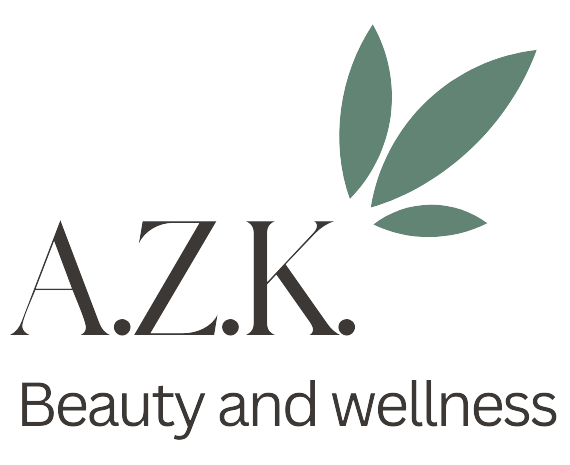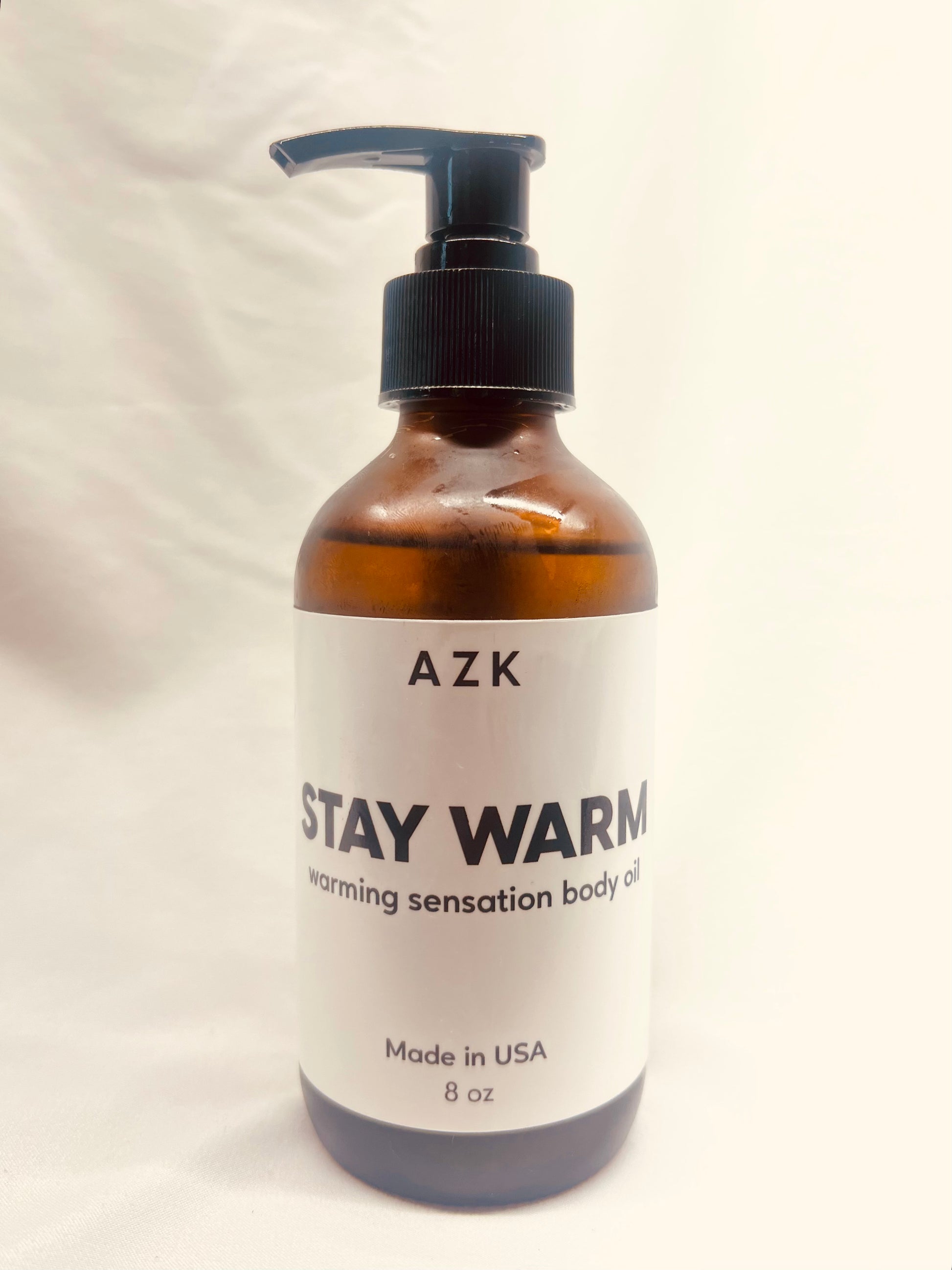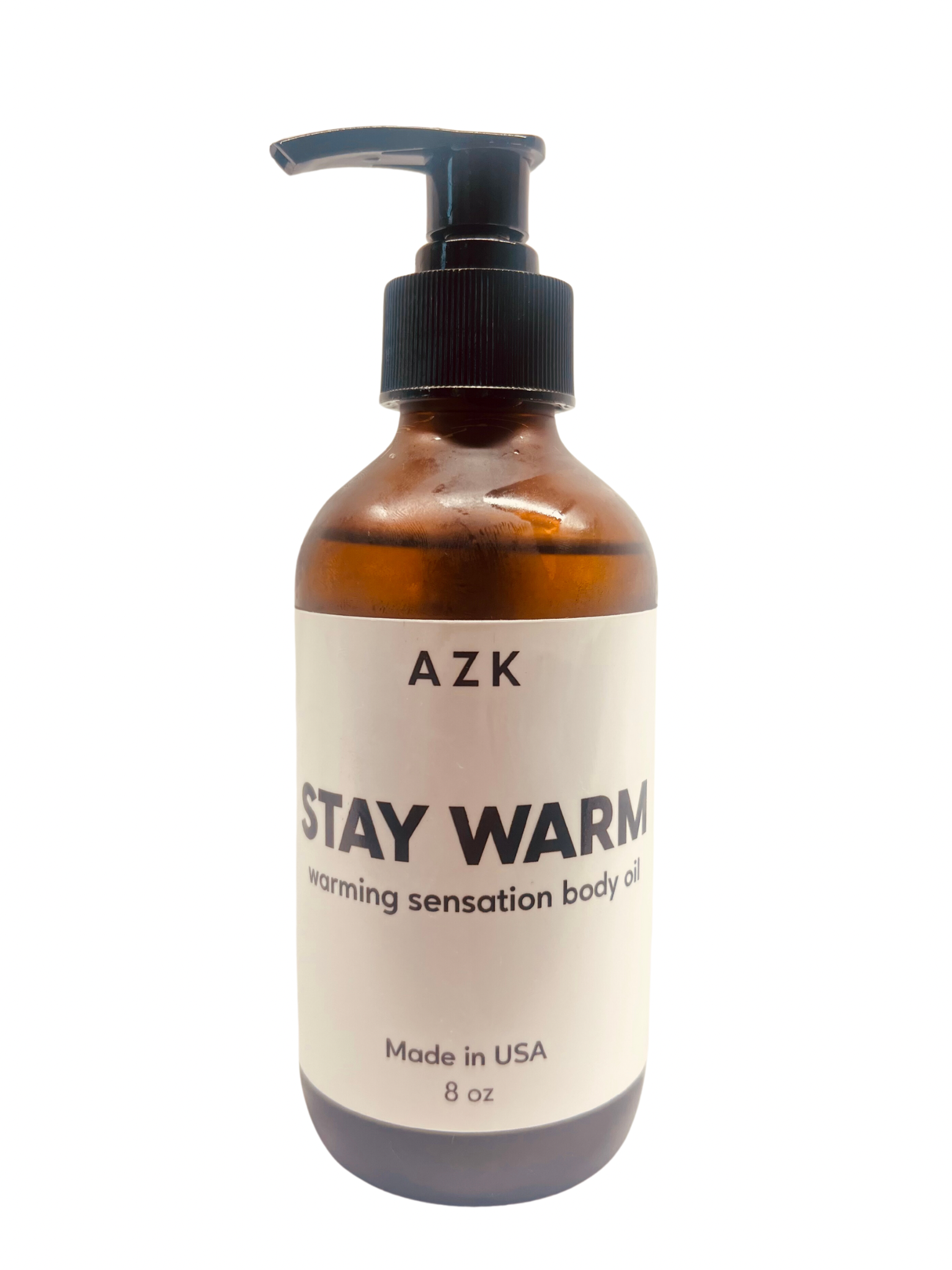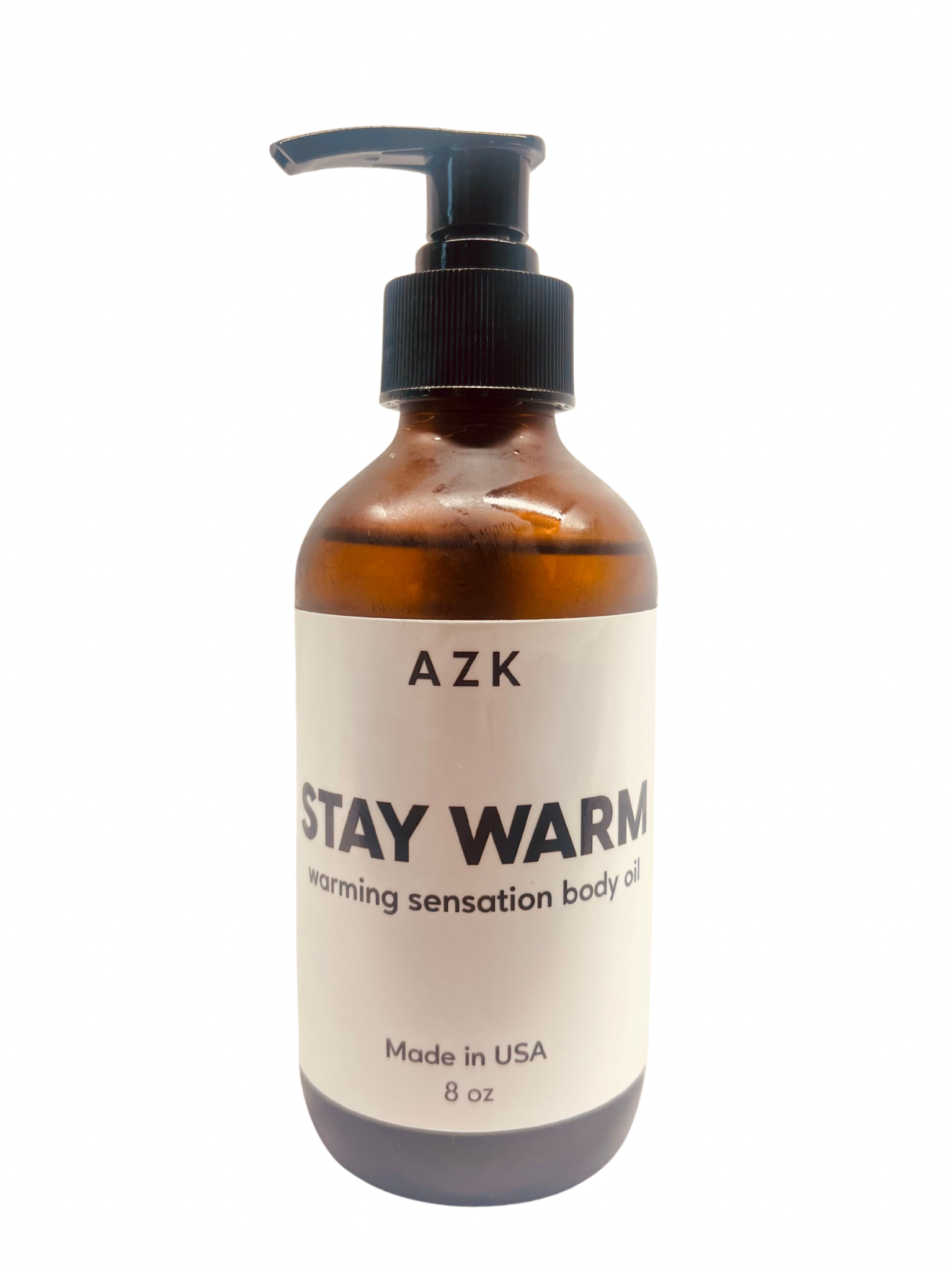A.Z.K. Beauty & Wellness
Body Oil Stay Warm
Body Oil Stay Warm
Couldn't load pickup availability
Jojoba
Olive oil
Frankincense
Vetiver
Sandal Wood
Oils and their benefits
Jojoba:
1. It’s moisturizing
Jojoba oil is a humectant ingredient. This means that it works to attract water to the top layer of the skin, helping to keep the skin hydrated. This may help prevent bacterial infections, acne, and dandruff from forming.
2. It’s antibacterial
Jojoba oil contains antimicrobial and anti-fungal properties.
It’s an antioxidant
Jojoba oil contains natural forms of vitamin E. This vitamin works well with your skin
as an antioxidant. This means that jojoba oil can help your skin fight oxidative stress caused by everyday exposure to pollutants and other toxins.
4. It’s noncomedogenic
Although jojoba oil is a botanical substance, its makeup is so similar to the oil (sebum) your body naturally produces that your skin can’t tell the difference.
This makes it less likely to build up on your skin and clog your pores, leading to fewer breakouts and less severe acne.
5. It’s hypoallergenic
On a molecular level, jojoba oil is a wax. Although it can be absorbed into your skin, its waxy nature allows it to create a soothing seal on the surface.
Unlike other botanical essential oils, jojoba oil is typically nonirritating. Allergic reaction is rare.
6. It helps control sebum production
Jojoba oil regulates sebum production because its so similar to the sebum that your body produces naturally.
When you put jojoba oil on your skin, your skin is soothed and moisturized. This sends a signal to your hair and sweat follicles that your skin doesn’t need additional sebum for hydration.
This keeps skin from looking oily and helps prevent acne caused by clogged pores.
7. It may help promote collagen synthesis
The antioxidants in jojoba oil may help your body produce collagen. Collagen is a protein that’s in your skin and joints as well as the parts of your body made of cartilage.
Collagen levels decrease as you get older. This is part of the reason your facial structure changes as you age.
8. It may help speed up wound healing
Jojoba oil is a promising ingredient
Trusted Source
in stimulating wound healing. Preliminary research shows
Trusted Source
that jojoba oil encourages your skin cells to bind together after they’ve been separated by a scratch or cut.
This may also be the reason for its ability to treat acne and acne scarring. These wound-healing properties could be connected to jojoba oil’s concentration of natural vitamin E.
9. Soothes eczema, psoriasis, and other drying skin conditions
Jojoba oil has anti-inflammatory and healing properties. Topical application may help relieve dryness, flaking, itching, and related symptoms.
People who have inflammatory skin conditions like psoriasis and eczema may find jojoba oil especially beneficial.
10. It may help soothe sunburns
Jojoba oil is a popular ingredient in some natural sunscreen products suggests that vitamin E, when combined with other antioxidants, can help protect your skin from sun damage. Jojoba oil contains both.
Sun damage can dehydrate your skin and cause flaking. Jojoba oil restores vitamin E, adds moisture, and promotes healing to soothe these symptoms of sunburns.
11. It may help treat acne
At least one clinical trial indicates that jojoba oil can help keep acne at bay. Jojoba oil has soothing anti-inflammatory agents, healing properties, is moisturizing, and is a natural antimicrobial.
These properties suggest that jojoba oil could help you avoid breakouts as well as promote healing for mild acne.
12. It may help reduce the appearance of fine lines and wrinkles
Oxidative stress to the appearance of fine lines and wrinkles. This means that the antioxidant power of jojoba oil may help slow the signs of aging when used on your skin.
13. It may help minimize the appearance of scars
Vitamin E has long been recommended by health professionals to help with scarring. Jojoba oil’s natural wound-healing properties combined with its vitamin E content, could minimize the appearance of scars.
Olive oil:
Olive oil penetrates deep into the skin to provide a long-lasting shield of moisture that keeps skin nourished all night long. Olive oil also contains essential fatty acids that replenish dry skin, leaving it smooth and supple. Restore your skin as you sleep and wake up with a silky smooth complexion.
Frankincense:
1. Helps Reduce Stress Reactions and Negative Emotions
When inhaled, frankincense oil been shown to reduce heart rate and high blood pressure. It has anti-anxiety and depression-reducing abilities, but unlike prescription medications, it does not have negative side effects or cause unwanted drowsiness.
A 2019 study found that compounds in frankincense, incensole and
incensole acetate, have the ability to activate ion channels in the brain to alleviate anxiety or depression.
2. Protects Skin and Prevents Signs of Aging
Frankincense benefits include the ability to strengthen skin and improve its tone, elasticity, defense mechanisms against bacteria or blemishes, and appearance as someone ages. It may help tone and lift skin, reduce the appearance of scars and acne, and treat wounds.
It may also be beneficial for fading stretch marks, surgery scars or marks associated with pregnancy, and healing dry or cracked skin.
A review published in the Journal of Traditional and Complementary Medicine indicates that frankincense oil reduces redness and skin irritation, while also producing a more even skin tone. Studies suggest that it’s the pentacyclic triterpene (steroid-like) structure of frankincense oil that contributes to its soothing effect on irritated skin.
3. Improves Memory
Research suggests that frankincense oil can be used to improve memory and learning functions. It helps relive anxiety and helps you focus.
4.. Acts as a Sleep Aid
Frankincense uses include lowering levels of anxiety and chronic stress that can keep you up at night. It has a calming, grounding scent that can naturally help you to fall asleep.
This natural sleep aid helps open breathing passages, allows your body to reach an ideal sleeping temperature and can eliminate pain that keeps you up, which has been verified in studies analyzing frankincense compounds.
5. Helps Decrease Inflammation and Pain
Frankincense has been shown in studies to inhibit the production of key inflammatory molecules associated with conditions like arthritis, asthma, painful bowel disorders like IBS and many more conditions.
It can be useful in helping prevent the breakdown of the cartilage tissue and has been shown to significantly reduce levels of dangerous and painful inflammation, making it a natural treatment option for pain-related conditions that affect the muscles, joints and tendons.
Vetiver:
9 Benefits Of Vetiver For Your Skin
1. Brightens Skin Tone
Vetiver is classified under ‘varnya’ or skin brightening herbs in the ancient Ayurvedic texts. It contains numerous phytochemicals that exhibit the ability to suppress melanogenesis [1] by decreasing tyrosinase (an enzyme responsible for melanin synthesis) activity.
Thus, including vetiver or its essential oil in your daily skincare routine can fade dark spots, acne marks and tanning and significantly brighten your skin tone.
2. Treats Eczema And Psoriasis
With the ability to balance inflammatory conditions, vetiver is a good remedy for eczema and psoriasis.
Apart from its anti-inflammatory benefits, vetiver’s cooling nature helps to relieve skin irritations and redness and treat skin burns. Vetiver is also highly recommended for sensitive skin, as it gently nourishes and heals without any adverse effects.
3. Moisturizes Dry Skin
vetiver prevents dryness-related skin conditions. It is added to various moisturizers and skin creams for its ability to replenish essential moisture in dehydrated and damaged skin.
Extracts of the herb successfully reactivated the production of skin lipids in mature skin, leaving it hydrated, plump and supple.
4. Balances Oil Secretions
Sebum acts as your skin’s natural moisturizer. However, hormonal fluctuations can lead to hyperactivity of sebaceous glands and overproduction of sebum, leaving your skin greasy and prone to acne.
Vetiver is a perfect herbal solution to oily skin problems. Including this astringent herb in your skincare routine can help regulate sebum secretions, tighten large pores and keep acne trouble at bay.
5. Heals Acne
Acne vulgaris is a common skin condition that occurs when excess oil, dead cells and dirt clog your skin pores to form comedones (blackheads and whiteheads).
If bacteria gets trapped in one of these pores, you may end up with an infected, painful, inflamed lesion known as a papule, pustule or nodule.
Vetiver helps treat acne in various ways. Its anti-inflammatory properties reduce swelling and its antimicrobial abilities curb bacterial proliferation in the pores.
It also helps to balance sebum secretions [2] on your skin and prevents chances of future acne outbreaks.
6. Detoxifies Skin
Vetiver is credited to be a natural detoxifier. properties cleanse your blood and remove these toxins from the body.
Both consumption and topical application of vetiver root can improve skin quality. In fact, folk medicine practitioners in certain parts of the world administer vetiver for snakebites to relieve poison from the body.
7. Anti-Aging
The epidermal barrier protects your skin from various environmental stressors. However, internal aging and repeated exposure to the sun cause an increase of free radicals in your body.
This leads to inflammation, reduced skin elasticity, barrier damage, decreased wound healing ability and more susceptibility to skin cancers [3].
The presence of potent antioxidant compounds such as alkaloids, flavonoids, terpenoids, tannins, saponins and phenols [4] make vetiver a strong scavenger of free radicals. It helps to reverse skin aging by fighting oxidative damage.
Further, its hydrating properties also help to reconstruct the skin barrier, reduce skin sagging and fine lines and give your skin a wrinkle-free, youthful glow.
8. Wound Healing
One of the qualities that describe vetiver in Ayurvedic texts is Apart from being antiseptic, vetiver strengthens connective tissues when applied topically on open wounds. This accelerates the healing process. It is also helpful in the treatment of weeping sores.
9. Treats Skin Infections
Vetiver can be used to treat certain bacterial and fungal infections of the skin. The essential oil of vetiver, extracted from its roots, is known to exhibit powerful antimicrobial activity against Staphylococcus bacteria [5] and a few others.
vetiver extracts were highly effective against various strains of fungus especially Asperigulls nigar and Asperigulls clavatus.
Sandal wood:
BENEFITS OF SANDALWOOD OIL FOR SKIN:
Treats Acne and Pimples
Removes Dark Spots and Scars
Fights Ageing Signs
Reduces Tanning and Pigmentation
Treat Eczema and Dermatitis
Lowers Stress and Improves Sleep
Helps nourish the skin,
Improve the elasticity of skin cells,
Even out skin tone.
May Improve Complexion
Share
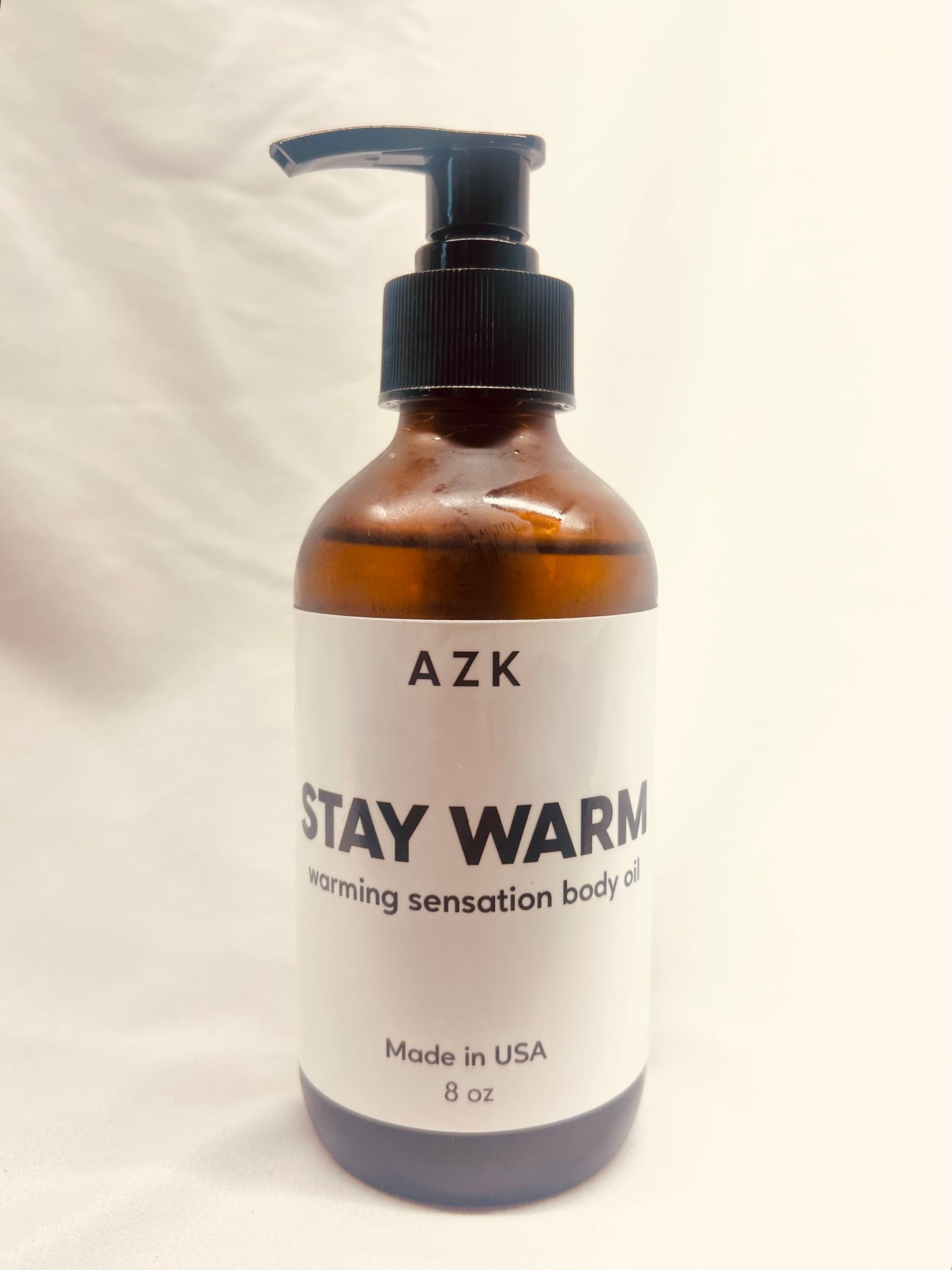
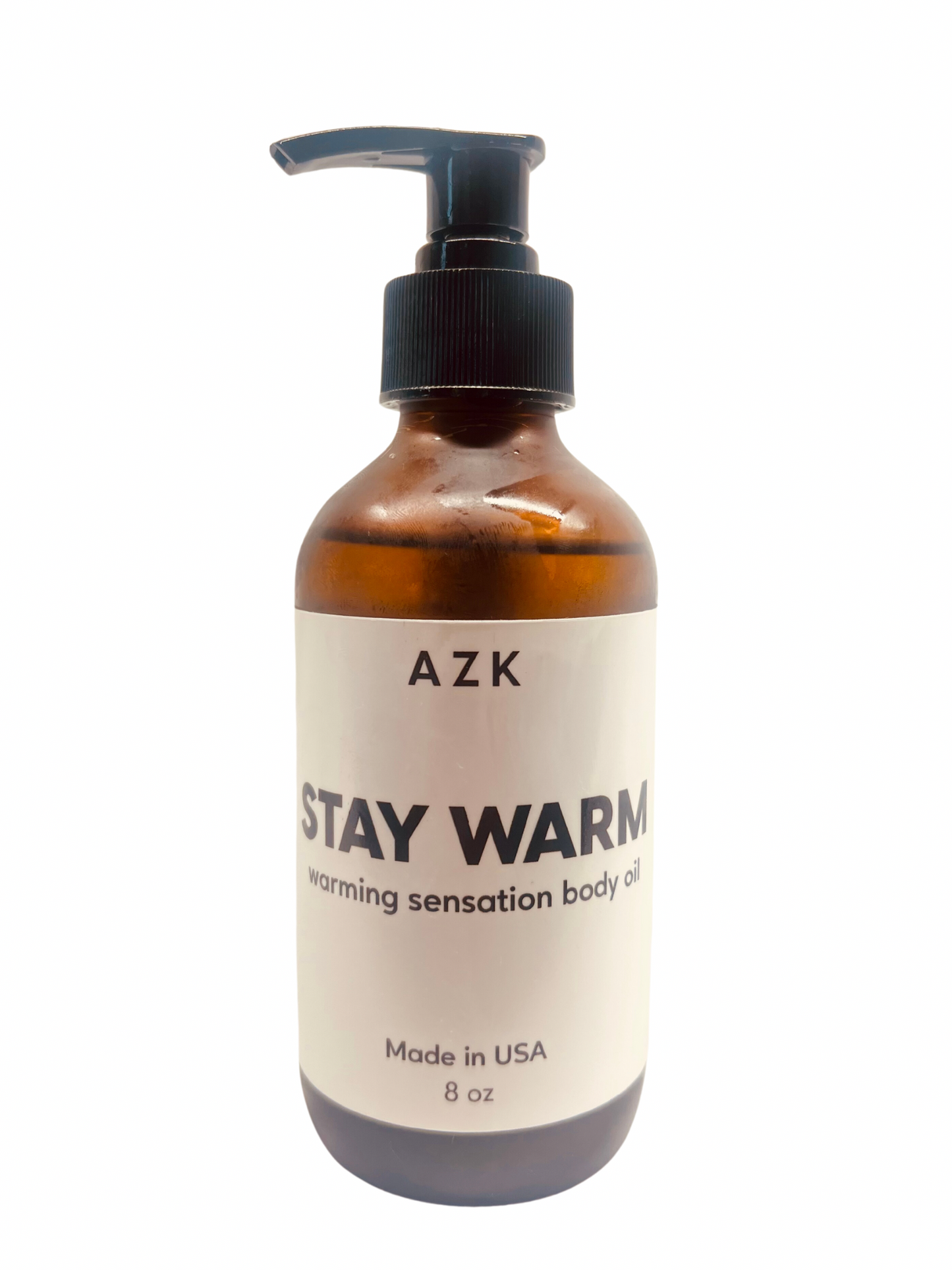
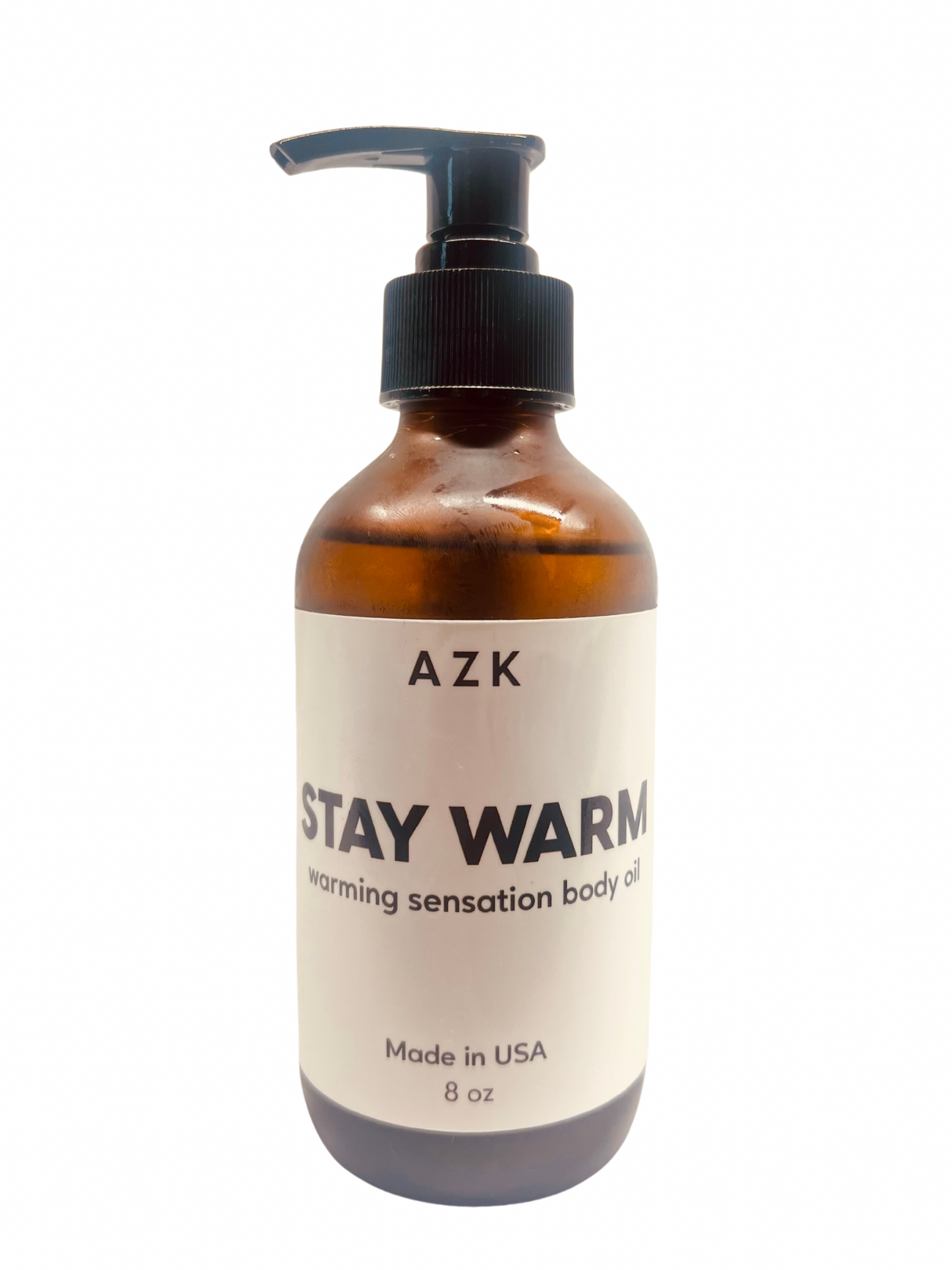
This body oil is a game-changer for me during the winter months. Not only does it keep my skin hydrated and glowing, but it also provides a subtle warmth that makes chilly days more bearable. I can't get enough of it!
I'm obsessed with the scent of body oil. Stay warm! It's like a blend of cinnamon and vanilla that instantly lifts my mood. Plus, it keeps my skin soft and supple, even in the coldest weather.
This body oil is a game-changer! Not only does it keep me warm during the colder months, but it also nourishes my skin deeply. The scent is subtle yet comforting. It is definitely a must-have in my winter skincare routine.
I absolutely love body oil. Stay warm! It's become my go-to during the colder months. The scent is divine and it keeps my skin hydrated and toasty all day long.
